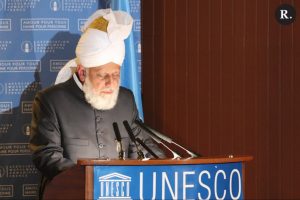
We present extracts from the writing of Hazrat Mirza Ghulam Ahmad, the Promised Messiah and Imam Mahdias, on displaying sympathy and compassion to all mankind and on the need to reform oneself to achieve this. These are re-published from the first volume of The Essence of Islam.
The second aspect of devoting one’s life to the cause of God Almighty is that one’s life should be devoted to the service of His creatures and to sympathise with them and to share their burdens and sorrows. One should suffer pain to bring them comfort, and one should experience grief to bring them consolation.
This shows that the reality of Islam is a very superior thing and that no one can truly deserve the title of Muslim till he surrenders the whole of his being to God, together with all his faculties, desires, and designs and till he begins to tread along His path withdrawing altogether from his ego and all its attendant qualities. A person will be truly called a Muslim only when his heedless life undergoes a total revolution and his evil-directing self, together with all its passions, is wiped out altogether and he is invested with a new life, which is characterised by his carrying out all his obligations to Allah; which should comprise nothing except obedience to the Creator and sympathy for His creatures.
Obedience to the Creator means that in order to make manifest His Honour, Glory and Unity, one should be ready to endure every dishonour and humiliation, and one should be eager to undergo a thousand deaths in order to uphold His Unity. One hand should be ready to cut off the other with pleasure in obedience to Him, and the love of the grandeur of His commandments and the thirst for seeking His pleasure should make sin so hateful as if it were a consuming fire, or a fatal poison, or an obliterating lightning, from which one must run away with all one’s power. For seeking His pleasure one must surrender all the desires of one’s ego; and to establish a relationship with Him one should be ready to endure all kinds of injuries; and to prove such a relationship one must break off all other relationships.
The service of one’s fellow-beings means to strive for their benefit purely for the sake of God in all their needs, and in all the relationships of mutual dependence which God has established out of true and selfless sympathy for them. All in need of help should be helped out of one’s God-given capacity and one must do his best for their betterment both in this world and in the hereafter.[2]
The purport of my teaching is: Believe in God as One without associate, and have sympathy with God’s creatures and be of good conduct and think no ill. Be such that no disorderliness or mischief should approach your heart. Utter no falsehood, invent no lies and cause no hurt to anyone whether by your tongue or your hands.
Avoid all manner of sin and restrain your passions. Try to become pure hearted, without vice. It should be your principle to have sympathy for all human beings. Safeguard your hands, your tongues and your thoughts against all impure objects and disorderly ways and all kinds of deceit. Fear God and worship Him with pure hearts. Refrain from committing wrong, trespass, embezzlement, taking bribes or unfair partisanship and keep away from evil companions. Safeguard your eyes against treachery and your ears against listening to backbiting.
Entertain no ill designs against the members of any religion or any tribe or group. Be sincere counsellors for everyone. Let no mischief-maker or one given to bad behaviour ever be of your company. Shun every vice and try to acquire every virtue. Your hearts should be free from deceit, your hands should be innocent of wrong and your eyes should be free from impurity. Take no part in any evil or transgression.
Put forth your utmost efforts to recognise God, finding Whom is salvation and meeting Whom is deliverance. He manifests Himself to him who seeks Him with love and sincerity of heart, and He reveals Himself to him who becomes truly His. Pure hearts are His thrones, and tongues that are free from falsehood, abuse and vain talk are the places of His revelation. He who loses himself in seeking His pleasure becomes a manifestation of His miraculous power.[3]
If the superiority of any Prophet can be established by such works as proclaim true sympathy with mankind exceeding that of all other Prophets, then, O ye people, arise and bear witness that in this respect Muhammadsa has no equal in the world…. Blind worshippers of creatures have not recognised that great Prophetsa who set forth thousands of examples of true sympathy with mankind. I perceive, however, that the time has arrived when this Holy Messengersa would be recognised. If you wish you might record my statement that henceforth the worship of the dead will decline daily till it disappears altogether. Will man set himself up against God? Will a despised drop frustrate the designs of God? Will the projects of mortal man disgrace Divine commandments? O ye who can hear, listen, and O ye who can reflect, consider and remember that truth will be proclaimed and he who is the true light will shine forth.[4]
Endnotes
1. This is a generic title given by The Review of Religions to describe the collection of quotes we have selected of Hazrat Ahmad, the Promised Messiahas. This title has not been used by the Promised Messiahas himself nor is it found in Essence of Islam.
2. A’ina-e-Kamalat-e-Islam, Ruhani Khaza’in, Vol. 5, pp. 60- 62 (Eng. Translation in The Essence of Islam, Vol. 1. pp. 22-23).
3. (Kashf-ul-Ghita’, Ruhani Khaza’in, Vol. 14, pp. 187-188 (Eng. Translation in The Essence of Islam, Vol. 1, pp. xxxiii-xxxiv).
4. (Majmu‘a Ishtiharat, Vol. 2, pp. 305-307 (Eng. Translation in The Essence of Islam, Vol 1, pp. 209-210).




These golden teachings are rare and worthy of practice especially today where man’s life is upside down. We pray we would be able to adopt these principles. Ameen.